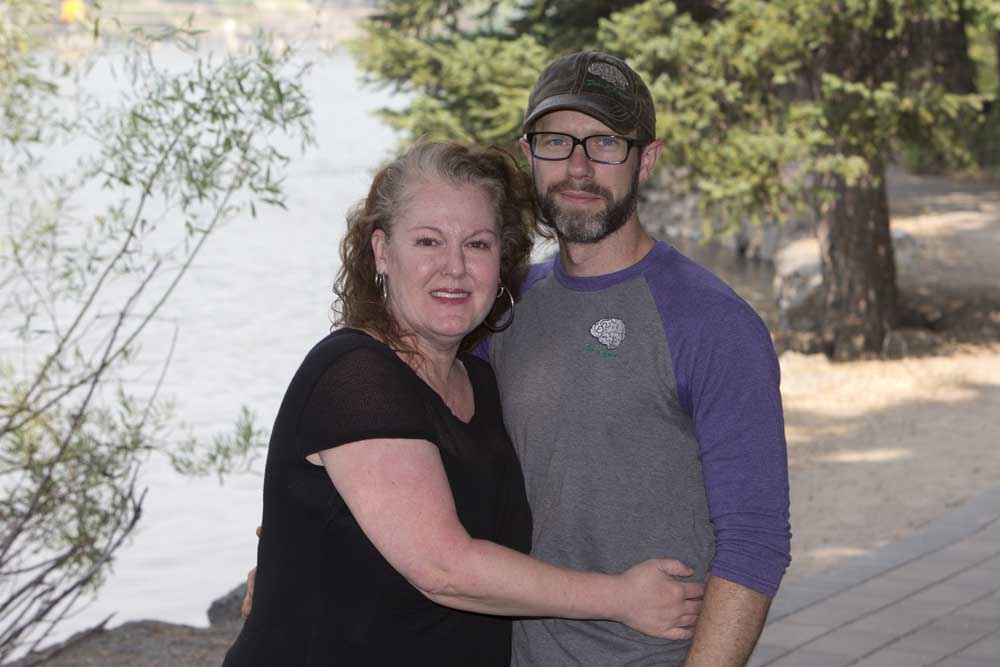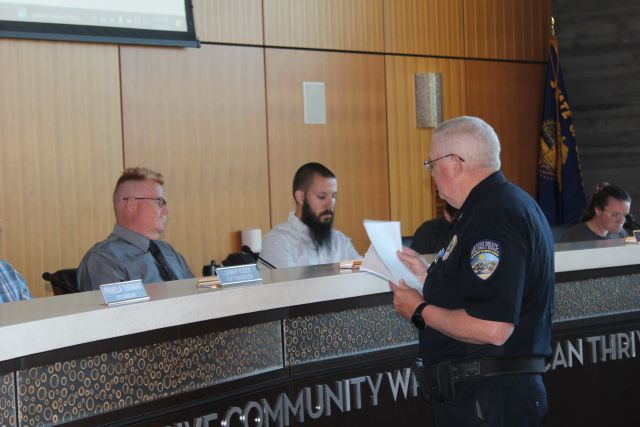Redmond man plans to run the 216-mile Cascade Lakes Relay solo
Published 12:00 am Thursday, July 26, 2018

- Kirsten Winchester, left, and her husband, Dearric Winchester, together in Pioneer Park in Bend on Monday. (Andy Tullis/Bulletin photo)
Kirsten Winchester talks openly about her husband’s lofty running goal.
“I have mixed feelings,” she says. “I know how hard it is on him, and I hate watching that happen. Yet I’m also incredibly proud, and love that he’s doing this for me.”
Trending
Redmond’s Dearric Winchester, 36, plans to run the 216.6-mile Cascade Lakes Relay course all by himself to promote a rather low-profile cause — migraine awareness — and to raise funds for migraine research. His wife, Kirsten, has suffered from debilitating migraine headaches for nearly 30 years.
Most entries in the 36-leg Cascade Lakes Relay include 12 runners, each running three legs, which range from 2 to 9 miles. This year, the annual race from Diamond Lake to Bend starts Aug. 3. The course takes runners from Diamond Lake Resort in eastern Douglas County east toward Silver Lake, then north and west past La Pine and up the Cascade Lakes Highway before turning back east toward Bend along Century Drive. The finish is located in Bend’s Riverbend Park, where some 3,000 runners will celebrate throughout the day Aug. 4.
Race organizers are allowing Winchester to start early, at 7 p.m. on Wednesday, Aug. 1. His goal is to finish in about 68 hours, by midafternoon on Aug. 4, making for about 75 miles per day for nearly three straight days. Along the way, a van of friends will serve as his support crew, carrying food, water, clothing and other necessities.
“There’s a lot that I know is going to go wrong and there’s going to be problems, but I have no idea what those are,” Winchester says. “I’ve tried to be diligent (in training) but life has just gotten in the way, so I know that will force me to adapt. I’m looking at the legs as checkpoints, but also when I need to change: ‘OK, I’ve been running this long and it’s time to walk.’ If we need to stop and find a place to rest, it’s flexible.”
Winchester says he will try to sleep during the heat of the day, then make up as much time as he can by running much of the course at night.
“But I’m going to have to spend some time in the sun,” he concedes. “The hills will be hills, but I’ve seen worse. It’s just the sun and the pavement. For me the pavement is actually the biggest concern, because I’m used to trails. It works your body differently.”
Trending
This will not be the first time Winchester has run an extraordinary distance in the name of migraine awareness. Two years ago he ran 150 miles of the Pacific Crest Trail — from Mount Hood to Mount Bachelor — in a little more than 50 hours.
“The last run I did was a great challenge and I got some feedback from some of the community,” he says. “But there wasn’t a lot of connection with it. It was a very isolated thing. People will actually be able to see this. From what I’m trying to do to raise awareness, I have to get people interested.”
According to migraine.com, more than 38 million people in the United States — about 13 percent of the U.S. adult population — suffer from migraines, intense headaches that can include nausea and sensitivity to light and sound. More than 11 million of those migraine sufferers blame the headaches for causing moderate to severe disability.
But according to the Winchesters — who have an 8-year-old son, Greyson — migraines are a disorder that many think they must simply cope with, rather than seeking treatment.
“That’s one in four households,” Kirsten says. “That’s a pretty large number, but then nobody talks about it. It’s a neurological disorder. It never fails to happen that somebody (Dearric) is talking to about it says, hey, I’ve got migraines or I have someone in my family who suffers from them.”
Dearric says he hopes his run will inspire the need for research, alternative treatment plans, and recognition of people who have the condition.
“And alongside that, the recognition that there IS a condition,” Dearric says. “That’s my biggest battle. I’m glad people are interested in WHAT I am doing, but I wish that people would see more of WHY I’m doing it.”
Should he succeed in finishing the 216.6 miles, Winchester would not be the first to do so alone. In 2010 and 2013, Erik Salkeld, of Tigard, finished the relay solo, according to race organizers.
Throughout his training, Winchester has competed in running races to serve as what he calls “meter events.” Earlier this month he competed in the Mt. Hood 50, which included a 50-mile run one day followed by a 50-kilometer run the next along the Pacific Crest Trail.
“It was painful,” he admits. “The first section of the 50-miler I did really well, but the second half took its revenge. I had to hike the entire thing on (the second day). There is good information there though.”
Winchester placed 84th out of 135 finishers in the 50-mile race in 11 hours, 31 seconds. In the 50K the next day, he was 117th out of 133 in 7:23:57.
He admits he is not a naturally gifted runner, and he is more accustomed to running on trails than on roads. Because the Cascade Lakes Relay is all on roads, the logistics with the support crew will be much simpler than during his PCT run. But running on the pavement might prove a challenge.
“The road is just that one surface over and over again,” Winchester says. “It won’t be anything fancy, just keep going.”
— Reporter: 541-383-0318,
mmorical@bendbulletin.com








